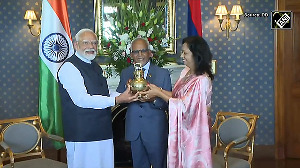The GST rate on mobile phones will be hiked to 18 per cent while that on maintenance repair overhaul (MRO) services for aircraft will be lowered to 5 per cent with effect from April 1, Finance Minister Nirmala Sitharaman said on Saturday.

Briefing reporters after the 39th GST Council meeting, she said Infosys Chairman Nandan Nilekani made a detailed presentation for the transition into a better GST Network system and the requirement of hardware to enhance capacity for addressing the system related issues that are being faced by taxpayers in the IT system.
The demand for more skilled manpower, better hardware to enhance capacity has been agreed to by the Council, she said.
The GST Council has decided that a completely enhanced capacity, a leaner system of GST Network with capacity enhancement, staff response, better solutions, which were envisaged and proposed by Nilekani by January 2021, should be completed by July 2020, Sitharaman said.
With regard to GST rates, the minister said there are four sectors -- footwear, textiles, fertiliser and mobile phones-- which face inverted duty structure wherein inputs are taxed at a higher rate than finished products.
"It was decided by the Council to raise the GST rate on mobile phones and specified parts which presently attract 12 per cent to 18 per cent.
"For all other items where there is duty inversion, if there is a need to calibrate the rates for removing inversion, it was decided we will take up the issue in one of the future meetings," she said.
The GST rate on handmade and machine-made matchsticks has been rationalised to 12 per cent from 5 per cent and 18 per cent respectively.
The GST rate on Maintenance, Repair and Overhaul (MRO) services in respect of aircraft would be reduced from 18 per cent to 5 per cent with full Input Tax Credit and change the place of supply for B2B MRO services to the location of recipient.
"This change is likely to assist in the setting up of MRO services in India," Sitharaman said.
The Council, chaired by the finance minister, also deferred implementation of e-invoice and QR Code to October 1, 2020, from an earlier timeline of April 1.
Also, the rollout of the e-wallet scheme for exporters too has been extended to March 31, 2021.
The Council also decided that the interest for delay in payment of GST would be charged on the net cash tax liability with effect from July 1, 2017, and the law would be amended retrospectively.
For GST registrations which have been cancelled till March 14, 2020, application for revocation of cancellation of registration can be filled up to June 30, 2020, as a one-time measure to facilitate those who want to conduct business.
The Council also relaxed the requirement of MSMEs from furnishing Reconciliation Statement in Form GSTR-9C, for 2018-19, for taxpayers having an aggregate turnover of below Rs 5 crore.
It also decided to extend the due date for filing the annual return and the reconciliation statement for 2018-19 to June 30, 2020.
For businesses with an aggregate turnover of less than Rs 2 crore, late fees would not be levied for delayed filing of the Annual Return and the Reconciliation Statement for 2017-18 and 2018-19.
The Council also approved a new facility called 'Know Your Supplier' to be introduced that will enable every registered person to have some basic information about the suppliers with whom they conduct or propose to conduct business.
Mobile phone makers cry foul
The GST Council's decision to hike the tax on mobile phones to 18 per cent will make handsets costlier and hit domestic consumption as well as the Make in India programme, industry players said on Saturday.
"This was time for statesmanship especially when the country is going through a crisis and as a nation, we have fallen short," ICEA chairman Pankaj Mohindroo said.
He said that the increase of GST from 12 per cent to 18 per cent will be extremely detrimental to the vision of Digital India.
"Consumption will be stymied and our domestic consumption target of USD 80 billion (Rs 6 lakh crores) by 2025 will not be achieved. We will fall short by at least Rs 2 lakh crores," Mohindroo said.
The government under the National Policy on Electronics 2019 has set a target to create a Rs 26 lakh crore domestic electronics manufacturing ecosystem by 2025. This includes the production of 1 billion mobile handsets valued at around Rs 13 lakh crore comprising Rs 5 lakh crore domestic sales and exports worth Rs 7 lakh crore.
The targets were set in terms of USD and due to variation in exchange rate the domestic market target has swelled by another Rs 1 lakh crore.
The industry body had approached Finance Minister Nirmala Sitharaman on March 12 against the proposal to hike GST on mobile phones saying that it will be detrimental for consumers buying handsets and in turn impact local manufacturing of the devices.
ICEA had said that the industry is under deep stress because of disruption in the supply chain due to coronavirus and it is a very inappropriate time to consider a hike in GST of mobile phones from the current level of 12 per cent.
The GST Council on Saturday decided to increase the tax rate by 6 percentage points on mobiles and certain components from April 1 due to the inverted duty structure, Finance Minister Sitharaman said.
Counterpoint Research Associate Director Tarun Pathak said, "This will impact the pricing and especially at a time when we are staring at uncertainty in the larger electronics supply chain due to coronavirus. An increase in price means a section of users will either go for second hand or even turn to grey market."
Chinese handset maker Xiaomi noted that the entire smartphone industry has been committed to Prime Minister's flagship Make In India initiative. "But today's recommendation by the GST Council to raise the GST rate on mobile phones from 12% to 18% will seriously harm the entire industry."
It mentioned that India's smartphone industry is already struggling with profitability due to depreciating rupee against the dollar and is also facing supply chain disruption due to the current COVID-19 situation.
"As a result of this GST increase, all smartphone makers will be forced to increase prices. This can weaken the demand and mobile industry's Make in India programme. This could also have long-lasting impact on internet penetration and digital India programme as a majority of Indians access internet on smartphones," Manu Jain, Managing Director, Xiaomi India, said.












 © 2025
© 2025